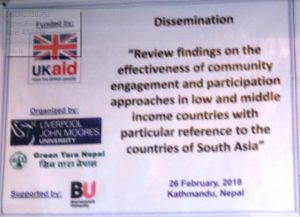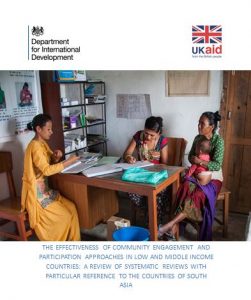 This morning we disseminated the findings of an evidence synthesis on ‘Effectiveness of community engagement and participation approaches in low and middle income countries’ in the Himalayan Hotel in Kathmandu. The study was designed to identify, analyse and summarise the findings of existing systematic reviews that have examined the effectiveness of community engagement/participation approaches in improving health, service delivery and sustainability outcomes. Therefore the overarching research question was: “How effective are community engagement/participation approaches for delivering better health outcomes, improving service delivery and sustaining benefits?”
This morning we disseminated the findings of an evidence synthesis on ‘Effectiveness of community engagement and participation approaches in low and middle income countries’ in the Himalayan Hotel in Kathmandu. The study was designed to identify, analyse and summarise the findings of existing systematic reviews that have examined the effectiveness of community engagement/participation approaches in improving health, service delivery and sustainability outcomes. Therefore the overarching research question was: “How effective are community engagement/participation approaches for delivering better health outcomes, improving service delivery and sustaining benefits?”
 Systematic Review of Reviews included 31 systematic reviews which examined community engagement/participation approaches in improving health (maternal and child health, infectious or communicable diseases, ‘other’ disease areas), service delivery and sustainability outcomes. There was wide variation in the aims and objectives, and methods of analysis across the included systematic reviews. In part this reflected a lack of a standard definition or terminology in how community engagement and participation approaches were described or characterised. The overall strength of the systematic review-level evidence has been categorised as of limited or moderate, however many systematic reviews reported consistent findings.
Systematic Review of Reviews included 31 systematic reviews which examined community engagement/participation approaches in improving health (maternal and child health, infectious or communicable diseases, ‘other’ disease areas), service delivery and sustainability outcomes. There was wide variation in the aims and objectives, and methods of analysis across the included systematic reviews. In part this reflected a lack of a standard definition or terminology in how community engagement and participation approaches were described or characterised. The overall strength of the systematic review-level evidence has been categorised as of limited or moderate, however many systematic reviews reported consistent findings.
Community engagement and participation approaches continue to be viewed as important, particularly in LMICs. The general trend in the evidence identified suggests that community engagement and participation approaches have played a role in successful intervention delivery across health system domains and areas of health. However the extent to which community ownership and empowerment is achieved greatly impacts on the sustainability of these approaches and our evidence draws out some key factors for consideration in the delivery of successful community engagement and participation.
The study was led by Prof. Padam Simkhada from Liverpool John Moores University with support from staff based at the University of Liverpool, Bournemouth University and Green Tara Nepal. The study was commissioned and funded by the Research and Evidence Division in the Department for International Development. The forthcoming report has been funded by UK aid from the UK Government.
Prof. Edwin van Teijlingen
CMMPH
 New CMMPH publication on maternity care in Nepal
New CMMPH publication on maternity care in Nepal Maternal mental health in Nepal ICM presentation
Maternal mental health in Nepal ICM presentation UK Nepali community research dissemination event
UK Nepali community research dissemination event










 REF Code of Practice consultation is open!
REF Code of Practice consultation is open! BU Leads AI-Driven Work Package in EU Horizon SUSHEAS Project
BU Leads AI-Driven Work Package in EU Horizon SUSHEAS Project Evidence Synthesis Centre open at Kathmandu University
Evidence Synthesis Centre open at Kathmandu University Expand Your Impact: Collaboration and Networking Workshops for Researchers
Expand Your Impact: Collaboration and Networking Workshops for Researchers ECR Funding Open Call: Research Culture & Community Grant – Apply now
ECR Funding Open Call: Research Culture & Community Grant – Apply now ECR Funding Open Call: Research Culture & Community Grant – Application Deadline Friday 12 December
ECR Funding Open Call: Research Culture & Community Grant – Application Deadline Friday 12 December MSCA Postdoctoral Fellowships 2025 Call
MSCA Postdoctoral Fellowships 2025 Call ERC Advanced Grant 2025 Webinar
ERC Advanced Grant 2025 Webinar Update on UKRO services
Update on UKRO services European research project exploring use of ‘virtual twins’ to better manage metabolic associated fatty liver disease
European research project exploring use of ‘virtual twins’ to better manage metabolic associated fatty liver disease